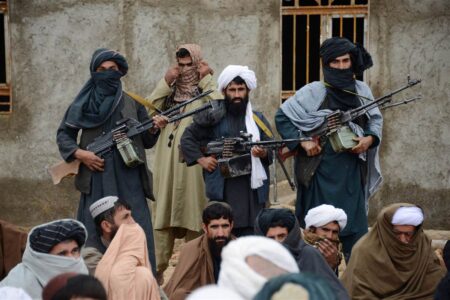
Al-Qaeda terrorist group pose serious risk to the United Kingdom
Twenty years after it carried out the 9/11 attacks the jihadist group remains active and has retained close ties with the Taliban. The network now poses a major risk to the security of the UK and its interests abroad, according to Robert Clark, a defence fellow at the Henry Jackson Society, who called it “incredibly worrying”.
He told Express.co.uk: “In terms of the threat that Al-Qaeda more significantly poses is absolutely the threat of further radicalisation and the fact that they can inspire through their messaging such large, disenfranchised sections of both British communities, Western communities and the local population as well.
“Similarly to ISIS, they can inspire British citizens to conduct atrocities and terrorist activities and attacks in Britain in their name which we’ve seen over the last 20 years from both Al-Qaeda and ISIS.
“If they’re allowed to gain more control, power, terror, recruitment, funding, then, of course, those capabilities will only magnify.
“You cannot rule out the threat posed by returning fighters from ISIS, we saw this in Iraq and Syria and the threat that they posed, and the aspects of radicalisation have to be considered of people returning from those areas.”
Mr Clark, who served in Afghanistan with the British Army before joining the London-based security think tank, pointed to the Taliban’s recent gains of vast swathes of territory across Afghanistan.
Since US President Biden announced the withdrawal of troops in April, the radical Islamic group have been emboldened and in recent days they have captured district after district.
This has led to fears in the West of the group sweeping in to the capital Kabul and taking back control 20 years after they were toppled by US troops and their Afghan Northern Alliance allies.
He said the insurgents’ recent successes would offer a major boost to Al-Qaeda, as the two groups are interlinked.
He said: “It’s important to note as well, there is no return of Al-Qaeda. Al-Qaeda has been in Afghanistan for the last 20 years in various parts.
“One of the troubling aspects to this is the rapid increase in territory gains the Taliban have had across Afghanistan in the last four months, and in particular over the last three weeks.
“If that continues, then inevitably the Afghan government will have to bring them into some form of power-sharing agreement.”
He added: “If that’s the case then large areas of territory which neither the Afghan government or the Taliban control, they will be up for grabs for extremist groups like Al-Qaeda, like Islamic State in Khorasan province.
“These entities, these terrorist organisations, will 100 percent pose a significant threat to both British and American interests.
“It’s not just the Taliban, it’s the secondary effects that the return to Taliban pose.”
He predicted some form of Taliban power-sharing agreement with the Afghan government to materialise “well before the end of this year” and said the UK security bosses will have their work cut out for them if such a scenario plays out.
Mr Clark, who served with the 2nd Battalion, The Royal Anglian Regiment, in Helmand province, said millions of Afghans would see the hands of the clock turned back overnight if their worst nightmare came true with the rise of the Taliban.
The group forbids education for girls and only allows boys to follow its own curriculum, which seeks to indoctrinate youngsters into their way of thinking.
Women are not permitted to leave their homes without a male guardian and are required to cover themselves fully with burqas.
The Taliban also forbids music, dancing and the mixing of genders.
Mr Clark explained: “I was last there in 2014 and patrolling the dusty villages of Helmand you saw girls in school, you saw women going about their daily business largely free from persecution.
“All of a sudden these everyday human rights that we in the West take for granted, they are going to be absolutely under threat and with no meaningful Western presence after this and the Afghan government are going to be at the mercy of the Taliban.”
And given the realistic threat of Afghans being forced back under Taliban rule, he said it is understandable if his fellow Army veterans and their families view the war “as a waste of those men and women who died”.
Since the UK invaded Afghanistan along with its US allies in October 2001, a total of 454 British troops have died.
Just over 400 of them were killed as a result of hostile action.
Source: Express





